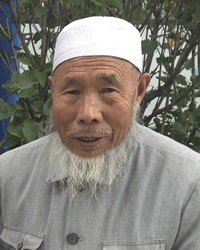Hui in Thailand

Photo Source:
Leslie D. Montano
|
Send Joshua Project a map of this people group.
|
| People Name: | Hui |
| Country: | Thailand |
| 10/40 Window: | Yes |
| Population: | 91,000 |
| World Population: | 13,901,000 |
| Primary Language: | Chinese, Mandarin |
| Primary Religion: | Islam |
| Christian Adherents: | 0.00 % |
| Evangelicals: | 0.00 % |
| Scripture: | Complete Bible |
| Ministry Resources: | Yes |
| Jesus Film: | Yes |
| Audio Recordings: | Yes |
| People Cluster: | Chinese Muslim |
| Affinity Bloc: | East Asian Peoples |
| Progress Level: |
|
Introduction / History
By the middle of the seventh century, Arab and Persian traders and merchants traveled to China in search of riches. In addition, in the thirteenth century the Mongols turned people into mobile armies during their Central Asian conquests and sent them to China. These civilians were expected to settle down at various locations to farm while maintaining combat readiness. As artisans, scholars, officials, and religious leaders, they spread throughout China. These people are the ancestors of today's Hui. One of the worst cases of genocide in history took place against the Hui in Yunnan from 1855 to 1873. One million Hui people were massacred.
The Hui are an official minority of China. The Hui speak standard Mandarin; although, in some locations, Persian and Arabic words have been added to their vocabulary.
The Hui are still mainly in China, but they also have communities in other Asian countries including Thailand.
What Are Their Lives Like?
The Hui are forbidden from eating pork, but that prohibition is often overlooked by calling the meat "mutton." When they are not around other Muslims, the Hui are likely to eat tasty pork.
The Hui are renowned as sharp businessmen. A Chinese proverb from the 1800s states, "A Chinese awake is not the equal of a Hui sleeping." The Hui in Thailand are often engaged in trade.
What Are Their Beliefs?
The people are Sunni Muslims who believe that the supreme God, Allah, spoke through his prophet, Mohammed, and taught mankind how to live a righteous life through the Koran and the Hadith. To live a righteous life, you must utter the Shahada (a statement of faith), pray five times a day facing Mecca, fast from sunup to sundown during the month of Ramadan, give alms to the poor, and make a pilgrimage to Mecca if you have the means. Muslims are prohibited from drinking alcohol, eating pork, gambling, stealing, slandering, and making idols. They gather for corporate prayer on Friday afternoons at a mosque, their place of worship.
The two main holidays for Sunni Muslims are Eid al Fitr, the breaking of the monthly fast and Eid al Adha, the celebration of Abraham's willingness to sacrifice his son to Allah.
Sunni religious practices are staid and simple. They believe that Allah has pre-determined our fates; they minimize free will.
In most of the Muslim world, people depend on the spirit world for their daily needs since they regard Allah as too distant. Allah may determine their eternal salvation, but the spirits determine how well we live in our daily lives. For that reason, they must appease the spirits. They often use charms and amulets to help them with spiritual forces.
What Are Their Needs?
There are no Christian believers among the Hui in Thailand. Who will tell them about the only savior?
Prayer Points
Pray for Hui culture to be renewed and enhanced by a work of the Holy Spirit and shaped into a God-centered and God-honoring mold.
Pray for the Holy Spirit to move among their family and community leaders to seek his face and enjoy his blessings.
Pray for the Lord to thrust out workers who will be compelled to nurture a disciple making movement among the Hui people.
Pray that soon the Hui people will have faith that will lead them to live honorable lives that will draw others to the savior.